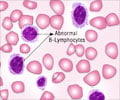Patients initially treated with acute lymphoblastic leukemia (ALL) therapy are more likely to achieve a complete remission than acute myeloid leukemia (AML)-treated patients.

- The best therapeutic approach for mixed phenotype acute leukemia (MPAL) has been identified.
- MPAL is a rare and aggressive leukemia.
- Starting treatment with a less-toxic regimen is associated with remission and long-term survival.
Comparing therapies for mixed phenotype acute leukemia
Physicians must decide whether to treat patients with therapy for ALL or therapy for AML, or a hybrid of both approaches. The problem is that there's no clear consensus on which approach is best.
"Because this disease is so rare, we haven't had clinical trials with thousands of patients to define the optimal therapy," says Etan Orgel, MD, MS, a specialist in MPAL and a physician in the Center for Cancer and Blood Diseases at Children's Hospital Los Angeles. "Instead, we have many small, isolated and often-conflicting case reports published in widely diffuse journals around the world. It's disjointed."
To make better sense of the available research and provide clearer treatment guidance for physicians, Orgel and a team of CHLA researchers embarked on the first-ever systematic review and meta-analysis of observational studies on MPAL. The team searched more than 17,000 published studies, eventually narrowing that list to 252 relevant papers from 33 countries covering 1,499 patients. Their review included studies using both the European Group and World Health Organization definitions of MPAL.
Key Findings
Patients initially treated with ALL therapy, a significantly less-toxic regimen, were three to five times more likely to achieve a complete remission than AML-treated patients.
"This makes a really convincing case that starting with ALL therapy is beneficial on all fronts, from remission to overall survival, if not from increasing survival, then from decreasing side effects," says Maria Maruffi, MD, the first author on the study.
"This research provides key insights to help guide physicians treating patients walking in the door today," says Orgel, associate professor of Clinical Pediatrics at the Keck School of Medicine of the University of Southern California. "But it also highlights the critical need for a clinical trial to definitively determine the best therapy for MPAL and help move treatment for this rare disease forward."
References:
- Maria Maruffi, Richard Sposto et al. Therapy for Children and Adults with Mixed Phenotype Acute Leukemia: a Systematic Review and Meta-Analysis, Leukemia doi:10.1038/s41375-018-0058-4
Source-Eurekalert












